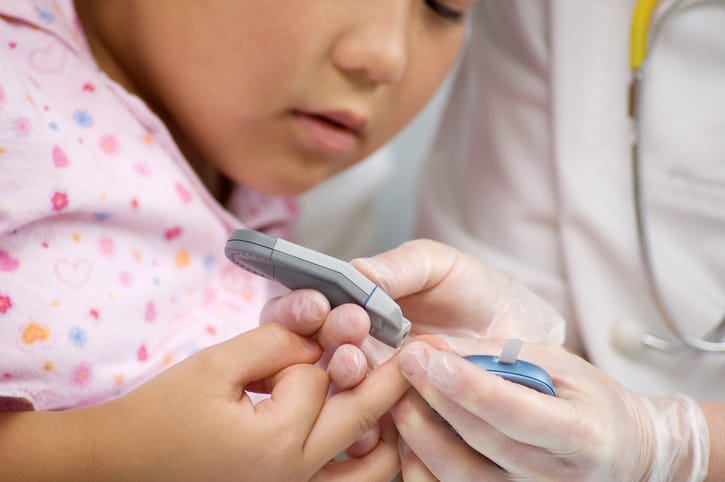Kids (and maybe even parents!) may prefer to sit on an electronic tablet and snack on candy all day, but we won’t stay healthy for very long by indulging in this habit. In fact, this habit – a sedentary lifestyle and poor diet – is a known cause of the significant rise in the pediatric diagnosis of Type 2 diabetes.
At Alzein Pediatrics, we know that a diagnosis of Type 2 diabetes means your child’s health, limbs, vision, and life are now at risk. According to the CDC, the rate of new cases of diabetes in people younger than 20 years old increased between 2002 and 2015 by 4.8%. These numbers were consistent across all demographics. In comparison, the increase for type 1 diabetes in the same age group was 1.9% and this rate varied across demographics.
The “Why” Behind the Rise in Pediatric Type 2 Diabetes
There is a direct correlation between obesity and the development of Type 2 diabetes. Decades ago, Type 2 diabetes was called “adult-onset diabetes,” but that has now changed. With the increase of technology, a sedentary lifestyle has become the new normal for children as bike riding, playing tag, and swimming is now replaced by playing video games and watching YouTube. The “American Style” diet of high sugar and highly processed foods contributes to the rise of Type 2 diabetes; researchers also agree that family history and genetics play a role in the early development of Type 2 diabetes.
What are the signs of Type 2 Diabetes in Children?
Type 2 diabetes may go undetected until there is a diabetic emergency such as diabetic ketoacidosis (DKA). DKA occurs when your child’s glucose level, the amount of sugar in their blood, is in an extremely elevated range. Both ketoacidosis and hypoglycemia (extremely low blood sugar) are life-threatening and require immediate medical attention.
To avoid these events, it’s important that Type 2 diabetes is diagnosed as soon as possible. For children, this disease can be diagnosed during a routine wellness check-up.
Early signs of type 2 diabetes include:
- Increased thirst and urination
- Fatigue
- Blurry vision
- Unexplained weight loss
- Darkened areas of skin, often found around the neck or armpits
The Prognosis and Problems of Type 2 Diabetes
Your child’s long-term health is dependent on how well their blood glucose level is managed with diet, exercise, and medical provider directives. As with other diseases, early intervention gives your child the best chance for the best outcome.
Type 2 diabetes management is not easy. If not done correctly, this disease can affect nearly every organ in the body including blood vessels, nerves, eyes, and kidneys. These challenges develop gradually over the lifespan and may become disabling or life-threatening, with cardiovascular/microvascular complications. These serious complications tend to occur after a person has had Type 2 diabetes for many years, so strict control and management of blood glucose are crucial to prevent complications.
Upon diagnosis, management of care can seem overwhelming for everyone as it requires a drastic change to lifestyle, diet, and exercise. When your child is a Type 2 diabetic, their mental health can be impaired just as much as their physical health. Watch for signs of depression, such as dramatic changes in sleeping habits, friends or school performance, or being persistently sad or pessimistic, and have your child assessed by a medical professional.
It’s helpful for both you and your child to seek encouragement from a Type 2 diabetes support group. Please visit the American Diabetes Association (ADA) for support materials or call our Alzein Pediatrics and speak to one of our medical professionals. We can help you find the support you need!
Prevention and Treatment of Type 2 Diabetes
Prevention and treatment of Type 2 diabetes look very similar and both require a healthy lifestyle. Caregivers should be consistent and strict about:
- Maintaining a healthy diet: Be strict about limiting or even eliminating processed foods. Focus on foods that are low in sugar, fat, and salt. Increase your family’s intake of fresh or frozen fruits and vegetables and whole grains. Eat meals on a consistent schedule to ensure blood sugar stays in the proper range.
- Stick to an exercise routine: This does not have to mean taking your young child to the gym and forcing them to run on a treadmill, but instead, creating an exercise routine that is fun. In the summer, play a game of tag in the backyard. Look through a park district guide and sign up for sports your child finds interesting. Make walking around the block part of your family’s daily routine. Get at least 60 minutes of physical activity on your child’s day.
The important part of both of these two points is that your child is not making these changes alone; you are making them as a family. These lifestyle changes will be easier if done as a group and will benefit everyone! Make sure your child knows you are with them on this journey and think of this as a household change for increased success.
As your child grows, their health changes. As your child ages, treatment may also change, especially during and after puberty. Regular blood monitoring and medical appointments will give your child the best chance to live a life with the fewest complications. If Type 2 diabetes is already diagnosed, it is possible that medication such as Insulin or Metformin will be required.
Do you have questions about your child’s risk of Type 2 diabetes – or their diagnosis? All of us at Alzein Pediatrics are here to help. Just click here to make an appointment or visit Our Evergreen Park, Oak Lawn/95th Street, and Urgent Care locations.


